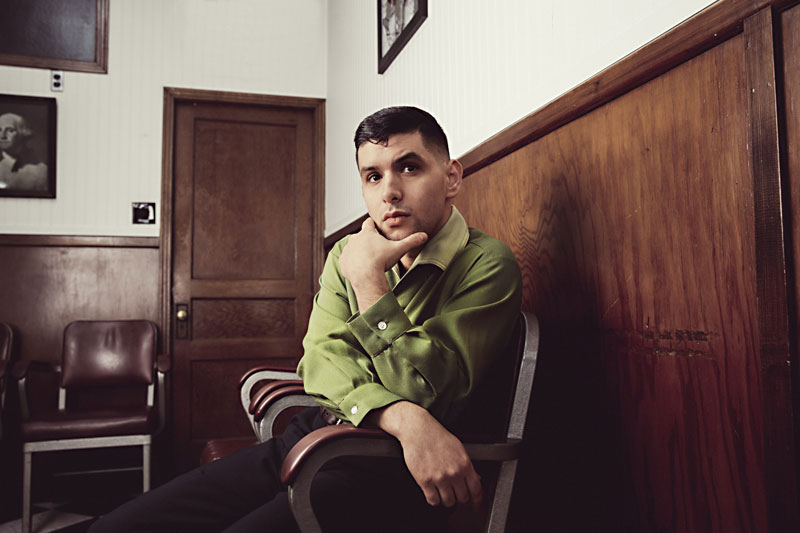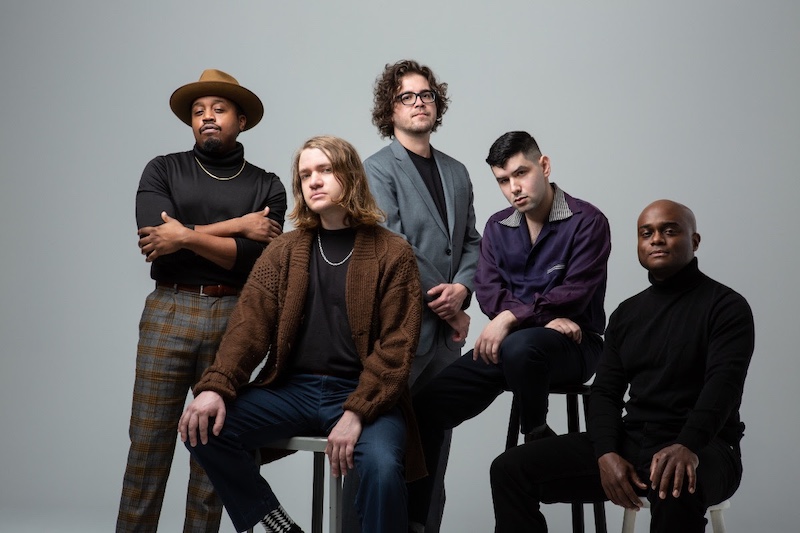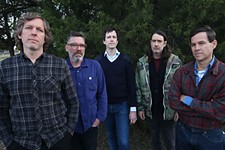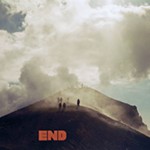Aaron Frazer’s MCU of Soul
The Indications’ drummer and soul crooner introduces himself at ACL
By Austin Powell, 8:00AM, Thu. Oct. 7, 2021
Aaron Frazer is pulling a rare double-header at the 2021 Austin City Limits Music Festival.
He’s a founding member of Durand Jones & the Indications – that’s his falsetto you hear on tracks like “Witchoo,” “Cruisin to the Park,” and “Ride or Die” – performing Friday on the T-mobile stage. The following afternoon, he’s stepping out from behind the drum kit in support of his Dan Auerbach-produced solo debut, Introducing…, which arrived earlier this year on Easy Eye/Dead Oceans.
You won’t want to miss either set.
On a day off of tour, from his apartment in Brooklyn, the singer/drummer/producer talked about his working relationship with Jones and the Indications, collaborating with Auerbach, and how he’s building his own MCU of soul.
Austin Chronicle: I want to start with “Is It Any Wonder.” It’s amazing to me how much traces back to that one song—both in terms of your connection to Dan [Auerbach], but also in finding your voice. Did you sense at the time that you had really stumbled onto something quite magical?
Aaron Frazer: I felt like I was hearing myself for the first time. There’s a word for instruments, tessitura. That’s the range for when an instrument sounds its best, like a cello can play super, super low or really, really high, but there’s a range where it’s at its best. For some reason when I listened back, I thought, that’s what I’m supposed to sound like. Maybe there’s something happening there. It’s different enough from my speaking voice that I could hear it like it’s own timbre, it’s own instrument. It just felt natural for the first time.
AC: How did that discovery change your writing and the dynamic within the band?
AF: It definitely changed. When I recorded those vocals, it was supposed to be for Durand to replace, but he liked how it sounded, we left it on the record, and then the feedback when the album finally came out was so strong for that song that we all kinda realized we have two singers here. That’s really unique in this current moment of music.
I don’t know about you – I love albums, of course – but when I’m listening to Spotify, I’m honestly listening to my same songs on a shuffle, or a playlist, or a radio station. And I think a lot of people are like that. So having some variation within a record or even in the same song opens up a lot of possibilities for us.
AC: That’s really captured on Private Space. That dynamic has taken an obvious step forward, especially on “Witchoo,” where you and Durand are working this high pick-and-roll chemistry. How did that song in particular come about?
AF: The short answer I guess is that I was spending a lot of time in my room, early pandemic, and I came up with this chord progression on midi keyboard with a drum loop. I had this rhythm in my head – ”nah nah na na na na na na” – that’s all it was for a little while. I sent it over to Blake [Rhein] and said, “This kind of bassline,” he laid it down. And then when we all met up last October in Bloomington, it’s funny you used a basketball metaphor because I think of it as a weave. I don’t know if you’ve ever seen the weave, people running down the court and passing it.
AC: The three-man weave, of course.
AF: That’s how writing feels like sometimes with the fellas. I had this bassline cadence, and then Durand, what he’s really great at is free writing. He’s a bold improviser. So he can just write, and from that source material, I was like, “Oh, that line’s cool, let’s take it from there and tighten it up.” Pretty soon after that we had the full hook and Durand was the one who was like, “Man, this is fire. Let’s go back and forth.” I’m really glad it took that direction.
But the other thing is, with touring in the States but especially in Europe, the record stores that we go into are different, like the 45s that we find, it’s not lowrider soul. It’s Italian disco, Eurogroove, and Dutch synth wave stuff, and it’s been really fun to soak in the sounds and sit with them for a while.
We DJ a lot after shows, not on this one because of COVID, but that’s also this place where you get insight into what moves a crowd. You can drop a needle on a record and people are like, “OK cool,” or you drop a needle on a record and you can literally see an entire room light up. There are lessons there. There’s a lot of wisdom in those moments.
AC: By necessity of course, but it’s interesting hearing you talk about writing that song in early COVID. This is the song of the hot-vax summer. It’s for gathering, for dancing, for moving. For you, what was that like trying to write for an experience that most people weren’t having?
AF: That’s an interesting question. This was definitely an aspirational party song. It was really weird. I kinda poked my head in on my partner who was in a Zoom dance party at one point [in the pandemic], and I could see the screen in Gallery View, and it was all of these little squares of people dancing in their bedroom, with their partners, with their stuffed animals by themselves. Some people had little disco lights on. It looked like something out of The Matrix. It was so weird, so trippy, but I do think that we need that right now. Sometimes you have to just get lost in something to get through a day.
AC: Were you experiencing something similar with the writing of your solo record as well?
AF: The solo record had already been written and recorded. We wrote it in November 2019, and recorded it in January 2020. We were working on songs as well for the new record in that period, and then afterward I was writing for the Indications, but also focused on all of the things that come with an album release, aside from the recording: trying to figure out what they call the assets – the music videos, the album art, the merch – but beyond that, what is even the tone of the rollout of this right now? When there’s so much rough shit happening in the world, how do you say, “Hey everyone, stop and look at my 12 love songs.” I mean, my record isn’t only love songs, but it’s hard to take up space like that in a time that’s really tumultuous.
Those were my two focuses in that period, but I also went down to Nashville and drummed on the new Yola record, Stand For Myself. I’m really happy with how it came out and am excited for her.
AC: The Auerbach touch is real. I love the vibe of that record.
AF: He’s got it. I really think he has a future in the industry. [laughs]
AC: When you’re writing for both records simultaneously, how do you know when something fits better with the Indications or it’s something you want to hold back, especially when you have a song like “Morning in America.” How do you let go of that track?
AF: I’m really proud of that one, but I see the Indications as one unit. We’re definitely individuals, but when we’re functioning at our best, we sort of speak as one voice. Durand singing a song I wrote doesn’t feel like I’m losing out on something. It’s just the right tool for the right job. That’s what I really try to abide by. Durand can do things I can’t do, and vice versa. And it’s beautiful to have that as an extension of your artistic self.
But as far as what’s right for my solo record and for the band, for Private Space, we had a pretty clear conception that we wanted to move forward in time a little bit, doing this later Seventies, but also bring in some contemporary pop stuff. With my solo record, I wanted to use that as a space to maybe explore some other influences. There’s some rock & roll represented on there, country gospel, Nineties R&B, as well as the post-hip-hop soul that I bring to the Indications too. “Leaning on My Everlasting Love,” the last song on my solo record, was a song that I brought to the group, and they liked it, but stylistically it just wasn’t keeping with what this batch of songs was going to be for Private Space. It’s almost more Sam Cooke or Sister Rosetta Tharpe. Making a record sometimes is just about cohesion. If there’s a song that you love that’s an outlier, just drop it as a single or use it for something else.
AC: There’s a lot to follow-up on there. One of the things I’m most curious about is how you avoid the tension in the Indications. Just looking at Spotify streams, the tracks you’re heavily featured on – “Is It Any Wonder?”, “Witchoo”, “Ride or Die,” “Cruisin to the Park,” “Don’t You Know,” “The Way That I Do” – are the most popular. How do you keep that cohesion, that spirit where everyone is doing what’s best for the sake of the song? How do you work through that?
AF: Well, Durand is such a generous, gratuitous front person. When we dropped “Is It Any Wonder” and we were getting all of this great feedback – even though it had been me, Blake, and Durand that started this from the jump – if he had been like, “Listen, I’m really excited for you. This is an awesome sound. I think you should pursue it, but I’m the singer and you do your own thing.” If he had said that, I think I would have said, “Yeah, OK, I’ll do my own thing.” But he didn’t. He’s really made space for me to be in the spotlight sometime, to thrive, and explore vocally. I feel really grateful for that. Not every front person would do that. I think it’s pretty rare, honestly. Not just the graciousness, but also the self-assuredness to step back for a second and to know that when they step back in to know they’re doing their thing and they’ve got it going on. And he does. You see us live and it’s incredible what he does – and in the studio to match.
I was just thinking about this before you called. Relationships are not like a painting, where you work on it and work on it until it becomes this beautiful thing and you’re done. It’s more like a plant. You have to nurture it. It takes maintenance. It could be in full bloom, but if you’re not maintaining it, it’s going to get fucked up.
We’ve really tried. When we’re on the road, we’ll schedule 1:1 time for different people in the band. Not just me and Durand, but everyone, to talk to each other, to have a place for a pressure valve in case there’s anything that’s building up, to just talk about it. I think that has helped us grow as bandmates and artistic collaborators.
Having a solo project is cool because it lowers the stakes a bit. If you’re only doing 12 songs every two years with a band, you’re like, “Oh shit. If my idea doesn't go, if this doesn’t turn out how I want it to,” that’s hard to deal with. But to go back to “My Everlasting Love,” it made sense the album [Private Space] is going in a different direction. But it’s a good song. I believed in it. So I’ll save it for another avenue that’s right for it. Durand is working on a solo project that I know is going to be fantastic. Our keyboard player, Steve Okonski is working on some stuff that’s going to be awesome. Our guitar player Blake [Rhein] is a great producer and has been working with bands in Chicago.
Our vision is kinda like Marvel and The Avengers. You have the main storyline, but you can pick your own favorites and follow them on their own adventures, where they have their own collaborators, and there are crossover episodes. It’s fun for us as creators, and I think it’s fun for fans. I know I really like it when I get to dig into different corners of an artist I really love.
AC: I do think it’s incredibly rare, which is why I wanted to dig in there, and I like the MCU metaphor. Knowing who you’re already connected to, I was surprised by the session players you ended up working with for Introducing.
AF: Dan handled the session staffing for the record. I’m usually the one handling the staffing for the Indications records. Usually what I do is call in the friends I’ve made over the years in Brooklyn, for strings, for horns, for background vocals. I’m really not going too far out of my people. It was definitely a little scary to take my hands off the wheel in that regard, but Dan obviously knows the best of the best, and I think he did a really good job of understanding who I am as a music fan and student and artist, and brought in a really cool set of players to reflect that.
I was so psyched to have Nick Movshon on bass. A lot of people know his playing from Amy Winehouse’s Back to Black record, the Daptones, Lee Fields, Charles Bradley. He really is at the core of this chapter of the soul-music revival. And he knows soul music the way that I do, which is filtered through hip-hop. I do think that shapes his sensibilities a lot. Bobby Wood was there on keyboards. He was a member of the studio band, The Memphis Boys, with Bubba Chrisman. He’s played with so many people and has such amazing stories.
Honestly, just looking up from my drum kit through the window and seeing Dan across from me playing guitar was the coolest thing. Before I discovered falsetto, I learned how to sing when I got my driver’s license, and I could just be by myself. I was listening to a lot of Black Keys, singing along to it. That’s part of what made the solo record work out the way it did. I had already learned so much from Dan before we ever got into the room together, before he ever called me while I was making dinner and was like, “Yo, let’s make a record.” He informed some of my songwriting sensibility. It was a good match.
AC: Is there a specific example that sticks out for how he impacted the record?
AF: One thing he told me before the session started is that all these people have decades of studio experience. And the cool thing about these players is that they don’t bring any ego with them. They’ll do whatever you want. They’re there to help you make a record. But my advice to you is, unless you have a really specific part in mind, see what they do first and adjust from there. You might find that they come up with something that you would’ve never thought of, and it could be the thing that makes the record – a little guitar part or a keyboard melody or something. As a producer myself, I thought that was a really beautiful piece of advice. He puts a tremendous amount of trust in the people he works with creatively and that can result in the whole being bigger than the sum of the parts.
AC: I interviewed Dan ahead of a SXSW appearance for his first solo record, and I remember him telling me about these trips he used to make, from Ohio down to the Delta, just chasing the blues. I was reminded of that when I read about the archival recordings in the Mississippi hill country.
AZ: Dude, it is interesting! Like, these parallel things. I kept the solo record really, really quiet for as long as I could. I don’t know.... I was scared. I didn’t want it to disappear. But when I finally announced it, I had a lot of people hitting me up who were like, “Did you ever think you’d be working with Dan Auerbach?” And in a weird way, I was like, “Yeah. I kinda did. At some point I thought our paths would cross.” I don’t know. The genesis of the Black Keys, of course, is the Junior Kimbrough/R.L. Burnside hill country blues stuff, and I fell in love with that too, and the Alan Lomax/John Lomax field recordings. I found out later that Dan spent a lot of time in that region as well. I love hip-hop. He did the Blackroc project. Getting into soul music, he covered Jerry Butler on Brothers [“Never Gonna Give You Up”]. He worked with Homer Steinweiss and Leon Michaels with the Arcs. There were a lot of parallels.
In terms of that time of my life, I got a grant from Indiana University. I was curious if these traditions that were really important to me were still going on and what it looked like. I went down there by myself for a few weeks, just going town to town. It was pretty much all North Mississippi, with the exception of Fayetteville, Arkansas, where I recorded David Kimbrough, one of Junior Kimbrough’s sons. He has a lot of kids.
I thought I wanted to work for the Library of Congress, but then I learned more about it. They’re acquiring more collections every day. It’s Sisyphean. You know what I’m saying. You’re trying to roll this thing up a hill. That wasn’t going to be it for me. But it was a beautiful experience and I learned a lot talking to musicians and whoever else. I feel grateful honestly for that time and for touring in general. In this political climate we’re in, there’s a lot of people who don’t really understand other parts of the country because this place is so big and people can be so different. I got 10 hours of interviews and songs, and I’d love to get it into an archive somewhere, some day, or release a compilation of it or something.
AC: And digitized, for the love of God. You hit on touring, so I just want to close with ACL. You’re playing with both the Indications and your solo project. Is that something you’ve done before?
AF: No, I haven’t done that much. Gigging in Brooklyn for years before the Indications popped off, I was playing with like seven different bands just nickel-and-diming my rent with the tip bucket. But in terms of the Indications and my solo stuff, no, this will be the first time. I’m excited.
Durand Jones & the Indications, Friday, 3:15pm, T-mobile stage Aaron Frazer, Saturday, 1:35pm, T-mobile stage
A note to readers: Bold and uncensored, The Austin Chronicle has been Austin’s independent news source for over 40 years, expressing the community’s political and environmental concerns and supporting its active cultural scene. Now more than ever, we need your support to continue supplying Austin with independent, free press. If real news is important to you, please consider making a donation of $5, $10 or whatever you can afford, to help keep our journalism on stands.
Nov. 3, 2023
Sept. 29, 2023
Aaron Frazier, Nick Movshon, The Memphis Boys, Bubba Chrisman, Durand Jones & the Indications, Bobby Woods, David Kimbrough, Junior Kimbrough, Dan Auerbach, Black Keys










